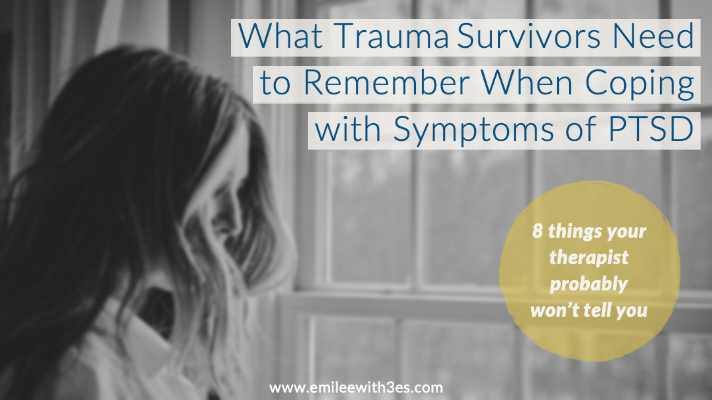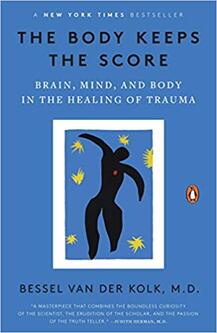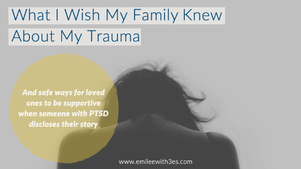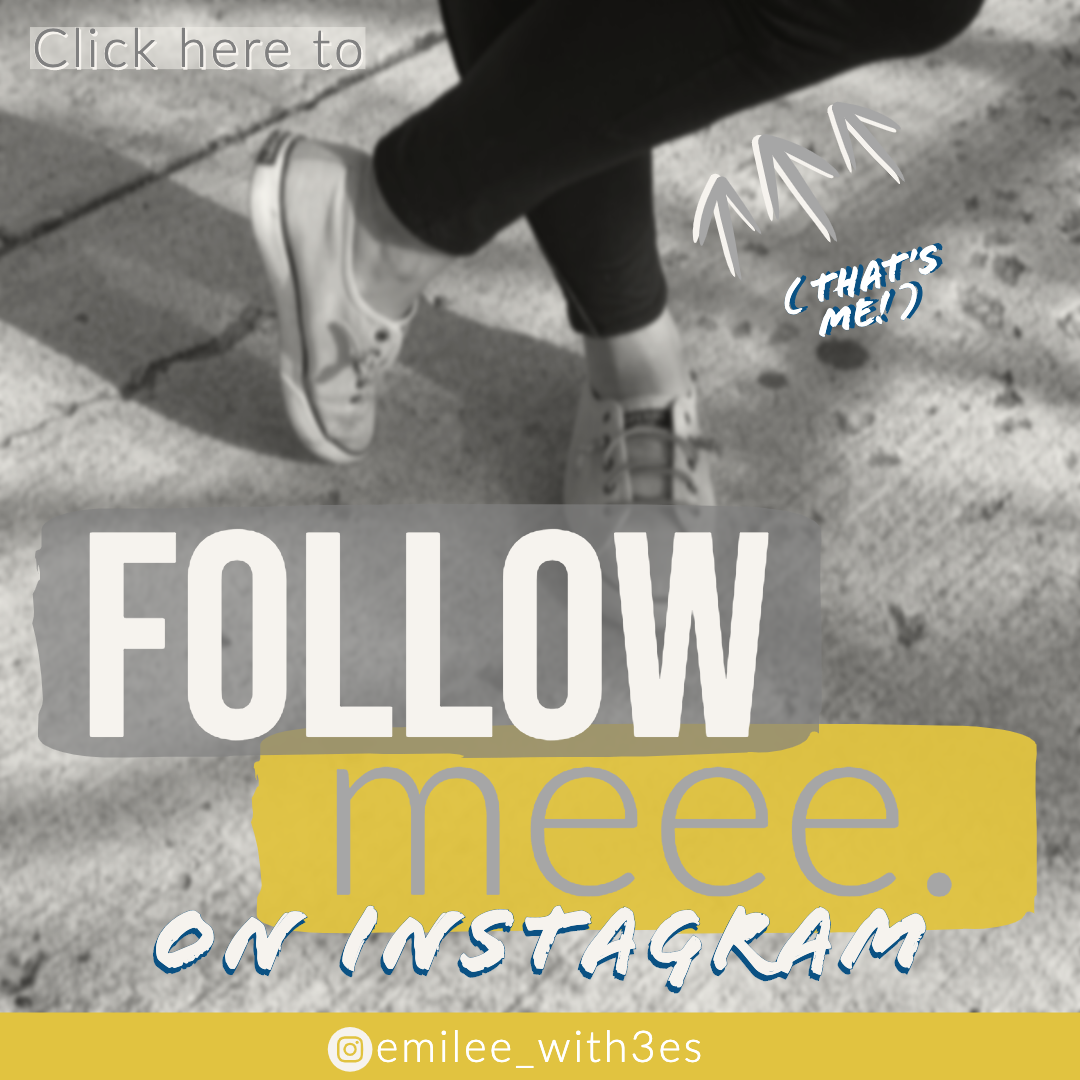|
Co-written by Vasterian202
Awareness is so important. But compassion is everything. Be kind to yourself. -@emilee_with3es
Building community and encouraging others to speak their truth are two major reasons I started this blog. I luckily got to accomplish both with the creation of this post.
The inspiration for it originated from a post I read on Reddit.com's r/ptsd subreddit. I often find myself on there, reading and commenting on posts that I feel especially connected to, partially as a way of building a sense of community. If you've never checked out Reddit, you need to.
This particular post's title read: "Diagnosed with PTSD this week, Whats something you guys could share to help someone try to understand better what they are going through?" You can probably see why I felt compelled to read more and eventually leave my 3 cents. I remember first being diagnosed and immediately wondering, "What does this actually mean?" I'll share the comment I wrote on that post at the very end here, but I wasn't only compelled to comment on the original post; I also felt strongly about another person's comment. Vasterian202 left a comment that was too well-written and too relatable for me to scroll past without giving it the proper applause it deserved. In my reply to Vasterian202's advice on this same post, I asked their permission to submit their comment as part of a guest post here on my blog, to which they kindly responded with the go-ahead almost immediately. The following 8 pieces of advice were written by Vasterian202 (who wishes to remain anonymous): (NOTE: this advice comes from the perspective of a trauma survivor who endured ongoing childhood abuse. It is important to acknowledge that not all survivors of trauma suffered their traumatic incidents at the hands of another person and such should be considered when reading these pieces of advice.)
FREE PTSD Self-Assessment
See if this checklist could be the discussion starter you need to talk to a doctor.
1. It's not your fault.
What OTHER PEOPLE chose to inflict on you was not your doing. How you treat others is doubly important, because you have the added responsibility of not repeating that damage on people you care about. Own your scars. Don't become them. 2. You will fuck up. You will hear that nasty little voice and it will tell you things and show you things to convince you you suck. You will over/under eat and sleep, you will yell and push people away who only want to help you. You will feel shitty about it. Do that, and apologise. Accept the shit. Then understand why you did that, use that knowledge to avoid being shitty the next time. 3. Don't expect to be cured. This isn't a thing you can ever walk away from. You can learn to walk with it; move within it a bit easier, uncover who you want to be and get better. It's a process. Be patient. 4. It's okay to be angry. Forgiveness is NOT mandatory, not to people who will never care or even admit that they hurt you. It's okay to mourn the child, the teen, the adult who never got to live without that pain. Do that. Do that, but don't chase them. You can't catch up to what never existed. 5. Find something to love in yourself. Even if it's only one tiny thing, let it shine. Then find another. Then another. Keep doing that until it sticks. Something as simple as "I like lemon cake" can become a source of joy. 6. It's okay to want things for yourself. It's okay to refuse something you don't want. It's okay to try and not enjoy something. It's okay to change your mind later. We all outgrow and fill into things. That's part of being a human. 7. No one can give you happiness. No one can give you peace. These things can be created through acceptance, understanding, and compassion for yourself and those around you. It is not a constant state of being. This is okay. 8. Victory is in the small things. A meal eaten and enjoyed, a day outside the house, a sink of dishes washed and put away. Take pride in the things you can do, and don't feel bad about things you can't. Do your best, even when all that means is getting out of bed. It still counts for something. -Vasterian202
My advice was slightly different.
Best piece of advice I could give? Read this book. And ask your closest family and friends to read it too. Because truthfully, no one knows how to respond to survivors of trauma. Unless you are a survivor yourself; and even then it's not always easy. Even if you’re not an avid reader, The Body Keeps the Score by Bessel van der Kolk M.D. will help you understand so, so much about why you (and your body) do what you do and think what you think. Plus, you can always get the audiobook instead and listen to it in the car or before bed or on the train. Either way, it's a must-read. Trust me. Awareness is so important. But compassion is everything. Be kind to yourself. You’re not alone. -e
More about the book and how to get your copy
The Body Keeps the Score: Brain, Mind, and Body in the healing of Trauma by Bessel van der Kolk M.D.
Description: Trauma is a fact of life. Veterans and their families deal with the painful aftermath of combat; one in five Americans has been molested; one in four grew up with alcoholics; one in three couples have engaged in physical violence. Dr. Bessel van der Kolk, one of the world’s foremost experts on trauma, has spent over three decades working with survivors. In The Body Keeps the Score, he uses recent scientific advances to show how trauma literally reshapes both body and brain, compromising sufferers’ capacities for pleasure, engagement, self-control, and trust. He explores innovative treatments—from neurofeedback and meditation to sports, drama, and yoga—that offer new paths to recovery by activating the brain’s natural neuroplasticity. Based on Dr. van der Kolk’s own research and that of other leading specialists, The Body Keeps the Score exposes the tremendous power of our relationships both to hurt and to heal—and offers new hope for reclaiming lives.
About Vasterian202A recent transplant to Peoria, IL, Vastarien202 enjoys writing short pieces and working on other projects for future publication with Sybaritic Press. Two cranky felines keep them in line and provide editorial advice by occasionally eating pages which offend, or laying on the keyboard to express disdain. Vastarien202 enjoys exploring their new home and learning its history. They are in recovery for C-PTSD and GAD, and are proudly on the Autism Spectrum. Monthly Newsletter
|
|
|
Leave a Reply.
Emilee with 3E's
I'm a 30-something single-ish lady who is enjoying city-life & a philanthropic career... most of the time.
Except of course when I'm crippled by the symptoms of my recently uncovered triple-D's: C-PTSD, ADD, & PMDD.
Should I change my name to Emilee With3E's and DDD's?
C'mon.. walk a [e]MILE[e] in my shoes! I have a great Sperry collection!
(As I always say, "Dress for the boat you want.").
(Truthfully? Mine are really only double). Keep reading...
A Note from Emilee:
Hey all! I hope if you've read this far that you've also read my About Mee page.
I am writing this note to say that I will use the following terms somewhat interchangeably throughout my writing, even though I do acknowledge their distinct differences:
1. PTSD / C-PTSD
2. ADD / ADHD
I am diagnosed with C-PTSD and ADD, which basically means my PTSD symptoms are more 'C'omplex than the average PTSD patient's, and I'm not 'H'yperactive; I just have an attention deficit.
However, the more commonplace terms are PTSD and ADHD. They are seen/heard/read about more, as opposed to their counterparts.
So, if I don't need to make any specific differentiations pertinent to the discussion about my symptoms of either C-PTSD &/or ADD, I may use 'ADHD' and 'PTSD' instead as blanket terms that should be interpreted as ways of also referencing my actual diagnoses.
If you have a concern about this, please, by all means, contact me and let me know,
The last thing I want is to offend someone with insensitive language, and I'd love to hear your perspective.
Comments?
Questions?
Book rec's?
Podcast rec's?
Find a syntax error?
Archives
March 2020
February 2020
January 2020
Categories
All
ADD/ADHD
PMDD
PTSD/C PTSD
PTSD/C-PTSD
Shame
Survivor's Guilt
This website uses marketing and tracking technologies. Opting out of this will opt you out of all cookies, except for those needed to run the website. Note that some products may not work as well without tracking cookies.
Opt Out of Cookies![Emilee with3E's: Navigating Life With [dis]Order(s)](/uploads/1/3/0/1/130181294/published/logo-paid.png?1578271690)







 RSS Feed
RSS Feed
